|
|
|
Sort Order |
|
|
|
Items / Page
|
|
|
|
|
|
|
| Srl | Item |
| 1 |
ID:
123018
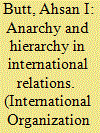

|
|
|
|
|
| Publication |
2013.
|
| Summary/Abstract |
This article questions the validity of anarchy as an assumption in International Relations theory. Powerful states often provide public goods to smaller states in return for their acquiescence on matters of interest. This transactional provision of public goods is analogous to how central governments behave in domestic environments; thus the hierarchic structure of domestic politics is replicated in international politics. The anarchy-hierarchy distinction, which rests on a neat separation of international and domestic structures, is therefore highly contentious. One public good that great powers provide, largely ignored by the literature on hierarchy, is justice. Powerful states can provide a forum for aggrieved parties to settle their disputes, and thus contain conflicts before they escalate to war. If such a forum is no longer provided, the system reverts to anarchy, where escalation-and therefore, war-is more likely. South America's war-prone decade can be explained by the variation in structural conditions on the continent. Due to the Depression, its Good Neighbor policy, and the onset of World War II, the United States was less interested in South American affairs in the 1930s, resulting in a more anarchic structure and a higher propensity for war.
|
|
|
|
|
|
|
|
|
|
|
|
|
|
|
|
| 2 |
ID:
123015
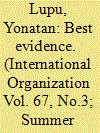

|
|
|
|
|
| Publication |
2013.
|
| Summary/Abstract |
Independent domestic courts play important roles in enforcing international human rights agreements, thereby providing a mechanism by which international institutions can affect government policy. Yet this enforcement power is constrained not only by independence but also by the courts' ability to overcome information problems. Domestic courts' enforcement power depends on information in two ways: the costs of producing legally admissible evidence of abuses and the applicable legal standards of proof. When countries ratify international agreements, judicial enforcement can improve government practices when evidence-production costs and standards of proof are low, but not otherwise. With respect to personal integrity rights violations, evidence is especially difficult to obtain, and standards of proof are high, meaning that the courts will not be able to constrain government practices. By contrast, evidence-production costs and standards of proof are lower for other civil rights violations, so courts will be able to prosecute offenders and bring governments into line with their international commitments. Consistent with this theory, I find that commitments to the International Covenant on Civil and Political Rights (ICCPR) have significantly improved governments' respect for the freedoms of speech, association, assembly, and religion. With respect to personal integrity rights, however, I find that commitments to the ICCPR have not improved government practices.
|
|
|
|
|
|
|
|
|
|
|
|
|
|
|
|
| 3 |
ID:
123017
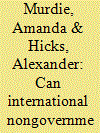

|
|
|
|
|
| Publication |
2013.
|
| Summary/Abstract |
Do international nongovernmental organizations (INGOs) lessen the need for states to provide their own services? In the case of health, many assume that INGOs limit health spending by governments. Against the conventional wisdom, we argue that these organizations create increased demand for governmental health spending through three mechanisms: (1) indirectly affecting the policy-making climate ("climatic conditioning"), (2) aiding domestic NGO and health activists in their efforts, and (3) directly pressuring governments for increased health spending themselves. Given these mechanisms, health INGOs, although typically supplying health services of their own within a country, should augment pressure for public service provision by the state and, it follows, lead to increased state health spending. We test our argument using a new data set on health INGOs, together with a well-established model of health spending, and find ample support for our arguments. Increases in health INGOs' activities do lead to increased governmental health spending, mainly by indirectly affecting the policy-making climate and, most especially, advancing the effective efforts of domestic activists.
|
|
|
|
|
|
|
|
|
|
|
|
|
|
|
|
| 4 |
ID:
123019
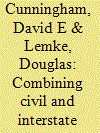

|
|
|
|
|
| Publication |
2013.
|
| Summary/Abstract |
Quantitative studies of conflict analyze either civil or interstate war. While there may be observable differences between civil and interstate wars, theories of conflict focus on phenomena-such as information asymmetries, commitment problems, and issue divisibility-that should explain both conflicts within and between states. In analyses of conflict onset, duration, and outcome combining civil and interstate wars, we find most variables have similar effects on both "types" of war. We thus question whether there is any justification for separate study of war types.
|
|
|
|
|
|
|
|
|
|
|
|
|
|
|
|
| 5 |
ID:
123020
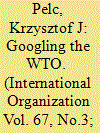

|
|
|
|
|
| Publication |
2013.
|
| Summary/Abstract |
How does international law affect state behavior? Existing models addressing this issue rest on individual preferences and voter behavior, yet these assumptions are rarely questioned. Do citizens truly react to their governments being taken to court over purported violations? I propose a novel approach to test the premise behind models of international treaty-making, using web-search data. Such data are widely used in epidemiology; in this article I claim that they are also well suited to applications in political economy. Web searches provide a unique proxy for a fundamental political activity that we otherwise have little sense of: information seeking. Information seeking by constituents can be usefully examined as an instance of political mobilization. Applying web-search data to international trade disputes, I provide evidence for the belief that US citizens are concerned about their country being branded a violator of international law, even when they have no direct material stake in the case at hand. This article constitutes a first attempt at utilizing web-search data to test the building blocks of political economy theory.
|
|
|
|
|
|
|
|
|
|
|
|
|
|
|
|
| 6 |
ID:
123016
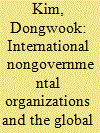

|
|
|
|
|
| Publication |
2013.
|
| Summary/Abstract |
During the past three decades national human rights institutions (NHRIs) have spread to more than one hundred United Nations (UN) member states and become key to human rights enforcement and democratic accountability. Given that NHRIs can take on a life of their own even under adverse conditions, why do governments in the developing world create permanent, independent national bodies with statutory powers to promote and protect human rights? Human rights international nongovernmental organizations (INGOs) are crucial for global diffusion. They empower local actors and influence governments in favor of NHRI adoption by mediating the human rights and NHRI discourses and mobilizing shame internationally. An event history analysis offers robust evidence that controlling for the UN, regional organizations, and other rival factors, human rights INGOs have systematic positive effects on diffusion. The case studies of South Korea and Malaysia provide process-tracing evidence that the hypothesized causal mechanisms are operative.
|
|
|
|
|
|
|
|
|
|
|
|
|
|
|
|
| 7 |
ID:
123014
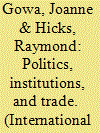

|
|
|
|
|
| Publication |
2013.
|
| Summary/Abstract |
Recent studies cast doubt on the value added of international trade agreements and institutions. Using a new data set that consists of about 35,000 observations on the trade of fifty-four nations between 1919 and 1938, we examine whether this skepticism also applies to the infamous interwar trade blocs. Traditional historical accounts attribute to them a large drop in international trade and a rise in the political tensions that would later erupt in World War II. In this study, we show that no bloc raised trade among its members as a whole or decreased trade between members and nonmembers. However, our findings are not wholly consistent with the skepticism recent studies express. We argue that conflicts of interest among the great powers encouraged the emergence of the bloc system and also gave rise to intrabloc trade shifts consistent with the political interests of their great-power hubs. The political-military alliances these conflicts created also reduced trade between their signatories, and we argue more generally that the causal chain runs from politics to trade. As a result, measuring only the effect of agreements and institutions on aggregate trade between their members can generate inaccurate estimates of their value added.
|
|
|
|
|
|
|
|
|
|
|
|
|
|
|
|
|
|
|
|
|